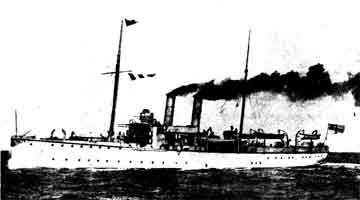1911 German Gunboat at Agadir

Morocco continued to be a source of crisis. In April, France was forced to commit substantially more forces to take control of the city of Fez. The Germans decided to challenge the increasing French dominance in Morocco by sending a gunship to a closed port, ostensibly to protect the rights of German citizens. The intervention resulted in crisis throughout Europe. The parties concerned arrived at a resolution of sorts when the Germans agreed to acknowledge the French right to establish a protectorate in Morocco in return for France ceding Germany a small area in the French Congo..
Morocco emerged as a flashpoint of European diplomatic tensions. The country's strategic location and rich resources made it a coveted prize, especially for France, which sought to expand its influence there.
By April, the situation in Morocco had become particularly volatile. Rising anti-foreigner sentiments and internal strife compelled France to deploy a substantial military force to secure control over Fez, one of Morocco's key cities. This was a clear indication of France's intent to solidify its foothold in the region.
However, Germany viewed France's increasing dominance in Morocco with suspicion. Intent on challenging the French and testing the strength of their alliances, Germany sought a pretext to intervene. This came when they dispatched the gunboat "Panther" to the port of Agadir, which was closed to foreign vessels. Officially, Germany claimed that this provocative act was meant to safeguard the interests and rights of German nationals residing in Morocco. In reality, it was a strategic move to assert German interests in the region.
The presence of the German gunship at Agadir sent shockwaves throughout Europe, sparking what came to be known as the Second Moroccan Crisis. The situation was so tense that some feared it might escalate into a full-blown war among the major European powers. Britain, in particular, was alarmed, viewing Germany's actions as a direct challenge not just to France, but also to the balance of power in Europe.
Diplomatic negotiations followed, revealing the depth of the great powers' ambitions and suspicions. Ultimately, a compromise was brokered. The Germans agreed to recognize France's right to establish a protectorate over Morocco. In exchange, France ceded to Germany a small stretch of territory in the French Congo, known as the Neukamerun.
This agreement, while averting immediate conflict, was more of a temporary fix than a lasting resolution. It reflected the precarious balance of power in Europe, characterized by rapidly shifting alliances and deep-seated rivalries. These tensions would, in just a few years, culminate in the outbreak of the First World War.
 >
>